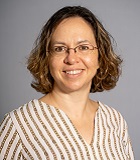From APHA: Reflecting on Dornsife’s Story Before & After The Harrison Spencer Community Service Award
Posted on November 25, 2024
By Dana and David Dornsife Dean Gina Lovasi, PhD, MPH

Below are Dean Lovasi’s remarks from an APHA conference session featuring Inaugural Harrison Spencer Community Service Award recipients. The Dornsife School of Public Health was the first institution to receive the award. The award is given to an ASPPH-member, CEPH-accredited school or program of public health that has demonstrated a major institutional commitment to addressing community needs through education, practice, and/or research.
Good afternoon. With little time I’m going to dive straight into sharing who we are, where we’ve come since the award, and where we are headed.
Our origin story matters here, and has two key elements.
First is our founding. Just two days ago, I was honored to meet at APHA Dr. Joni Williams who graduated from our school with the class of 1998. In those early days of our school’s story, we were the Allegheny School of Public Health and Jonathan Mann served as the founding dean. Dean Jonathan Mann set a vision for our school that we continue to reach toward, by centering health as a human right and social justice.
A second part of our origin story is joining Drexel University. Our school entered this new phase in 2002, under leadership of Dean Emerita Marla Gold, and Drexel’s focus on immersive experiential learning keeps our aspirational identity in close contact with real world challenges, bringing boots on the ground relevance to our educational and research activities.
From this origin we moved forward under leadership of Dean Emerita Ana Diez Roux, receiving our naming gift in 2015 and then the Harrison Spencer Award in 2018. Together, these recognize our partnerships and community service in Philadelphia, and set us up for a trajectory extending our work across the US and globally.
With limited time to tell our story, I will mention just 3 of the partnerships highlighted at the time of the award, and link them to directions that have emerged and have presence at this conference. Time permitting, I’ll also share about several concurrent efforts to strengthen inclusive excellence.
Fi
Second, the work of John Rich with youth affected by gun violence was among the hospital-based and trauma-informed efforts highlighted at the time of our award. Healing Hurt People and the other activities of the Center for Nonviolence and Social Justice continue to have impact under leadership of center director Arturo Zinny. In fact, just last week he was sharing about their work at the request of the White House, highlighting the Medicaid reimbursable peer-support programing that has provided new light in the lives of young Philadelphians touched by gun violence tragedy.
Third and finally, strong ties with the Philadelphia Department of Public Health were highlighted, cultivated by associate dean for public health practice at the time Jennifer Kolker who was also instrumental in assembling materials for award consideration. Certainly, work with governmental partners in and around Philadelphia remains strong, including place-based initiatives highlighted in a session yesterday moderated by Amy Carroll-Scott. Yet our efforts are far from contained within Philadelphia. Jen’s work has extended across to other large cities through the Big Cities Health Coalition, and abroad to support public health infrastructure planning in Ukraine. Amy is one of the MPIs for the coordinating center of ComPASS, Community Partnerships to Advance Science for Society or ComPASS. This project is a massive undertaking, connecting Drexel to a network of 5 hubs and 25 community health equity structural intervention efforts across the U.S.
Before I wrap up, I want to highlight three ways we are working to strengthen an antiracism lens for inclusive excellence at our school. We are one of seven ASPPH member schools funded by Robert Wood Johnson Foundation (RWJF) in Transforming Academia for Equity, which is led by Associate Dean for Diversity, Equity, Inclusion and Belonging, Reneé Moore. This has fueled growth in the funded opportunity for students to contribute toward our anti-racist action plan as IDEA fellows. Our school’s Ubuntu Center on Racism, Global Movements, and Population Health Equity has also been awarded funding from RWJF with a project to address structural racism in health care, and has led the way for new educational formats for community audiences through teach-ins. And the NIH-funded Drexel FIRST Initiative has been designed in partnership between our school and the College of Nursing and Health Professions to embrace inclusive excellence in health disparities research.
This legacy is certainly not mine alone, and in fact it is daunting for me as a new dean to be the one to share with you, especially since by necessity I have omitted more than I have shared. But I am reassured when I think of the determination of our school community. And that sense of reassurance grows to a surge of confidence as I stand in this room with others who are likewise committed to a public health future we can all be proud of. Thank you all for your time today, and your partnership going forward.